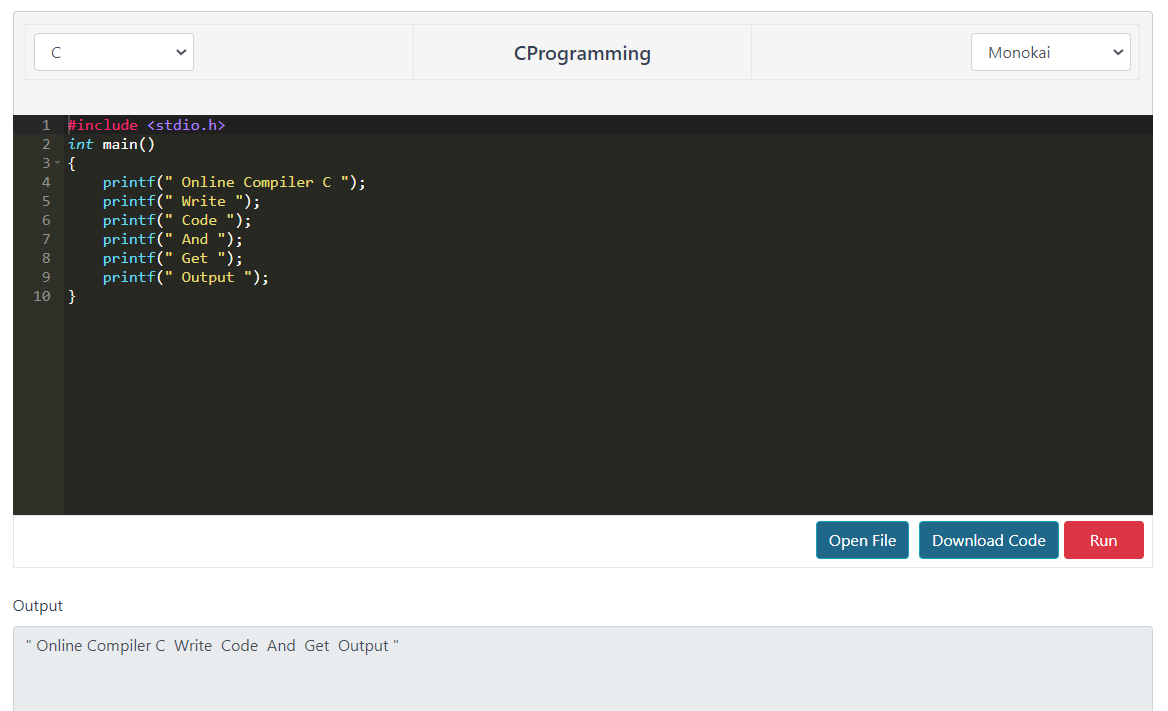Online Compiler C Programming
|
Programming
|
|
|
Show Input
|
|
Online Compiler C is a free C compiler and Integrated Development Environment (IDE) that anyone may
use to learn and practise C programming. Users may develop and run C programming directly in the
browser without having to install any software on their computers.
Online Compiler C user-friendly design and strong capabilities make it simple for beginners to get
started with C programming and for expert users to test and debug their code.
Online Compiler C
Online Compiler C is a powerful online tool for developers that allows users to write, build, and run C Programming code online. You may simply build, modify, and test C programmes using this platform, which requires no other software or installation.
The platform provides a user-friendly interface, making it easy to write, debug, and test your code. You can also customize the font size and style to match your preferences.
Online Compiler C supports a variety of C compilers, including GCC, Clang, C++ and C# , making it simple to build and run your applications across platforms.
Online Compiler C is an excellent tool for learning, testing, and debugging your code, whether you
are a beginner or an experienced C developer.
So, why delay?
Try it out today and discover the convenience and flexibility of online C programming!
Overall, Online Compiler C is a powerful and easy-to-use tool for developers who want to write, compile, and run C programs online without any installation or configuration hassle.
In case you encounter any issues with our compiler, kindly get in touch with us using our contactpage.
Compiler Output

About C Programming
C is a general-purpose, high-level programming language that was originally developed by Dennis Ritchie at Bell Labs in the 1970s. It is a structured programming language that supports a wide range of programming constructs, including functions, loops, conditional statements, and pointers.
C’s ability to directly handle memory is one of its distinguishing properties, making it a
great language for system programming and embedded system development.
C is also highly portable, which means that programmes written in C may run on a number of systems
with minimal modification.
C has had a significant influence on the development of many other programming languages, including C++, Java, and Python. It remains one of the most widely used programming languages today, with applications ranging from operating systems and device drivers to scientific computing and video games.
Why should I learn C?
There are various advantages to learning C, including:
- Widely used language: C is a widely used computer language that serves as the foundation
for many other programming languages.
It is used in the development of operating systems, embedded systems, device drivers, and other applications. - Low-level programming: C allows you to write low-level code that interacts directly with hardware, which makes it perfect for designing embedded systems and device drivers.
- Speed and efficiency: C code is generally fast and efficient, making it ideal for applications where speed is critical.
- Memory management: C supports manual memory management, giving you greater control over how memory is allocated and dealtlocated.
- Portability: C code is portable because it can be compiled to run on several systems and architectures.
- Career opportunities: C is a valuable skill to have in the jobs market, with many companies looking for C-experienced developers.
Syntax help for C programming:
1. If Else:
If-else is a conditional statement in C programming that allows a programme to execute certain statements based on the outcome of a Boolean expression. The following is the basic syntax for an if-else statement:
if (condition) {
// block of code to be executed if the condition is true
}
else {
// block of code to be executed if the condition is false
}
Here, condition is the Boolean expression that is evaluated. If the condition is true, the block of code inside the if statement is executed. Otherwise, the block of code inside the else statement is executed.
For example, the following code snippet uses the if-else statement to determine if a given integer is even or odd:
#includeint main() { int num; printf("Enter a number: "); scanf("%d", #); if (num % 2 == 0) { printf("%d is even.", num); } else { printf("%d is odd.", num); } return 0; }
2. Switch Case:
The syntax for a switch-case statement in C programming language is as follows:
switch(expression) {
case constant-expression1:
// code to be executed if expression matches constant-expression1
break;
case constant-expression2:
// code to be executed if expression matches constant-expression2
break;
// more cases can be added
default:
// code to be executed if none of the cases match expression
}
3. Loop:
These are several loop examples in C programming:
1. For loop:
for (initialization; condition; increment/decrement) {
// code to be executed
}
2. While loop:
while (condition) {
// code to be executed
}
3. Do-while loop:
do {
// code to be executed
} while (condition);
The condition is verified at the beginning of all three loops.
The loop body is performed if it is true.
Following the execution of the loop body, the increment/decrement statement (for for loop) is run, and
the condition is verified again.
This operation is repeated until the requirement is satisfied.
